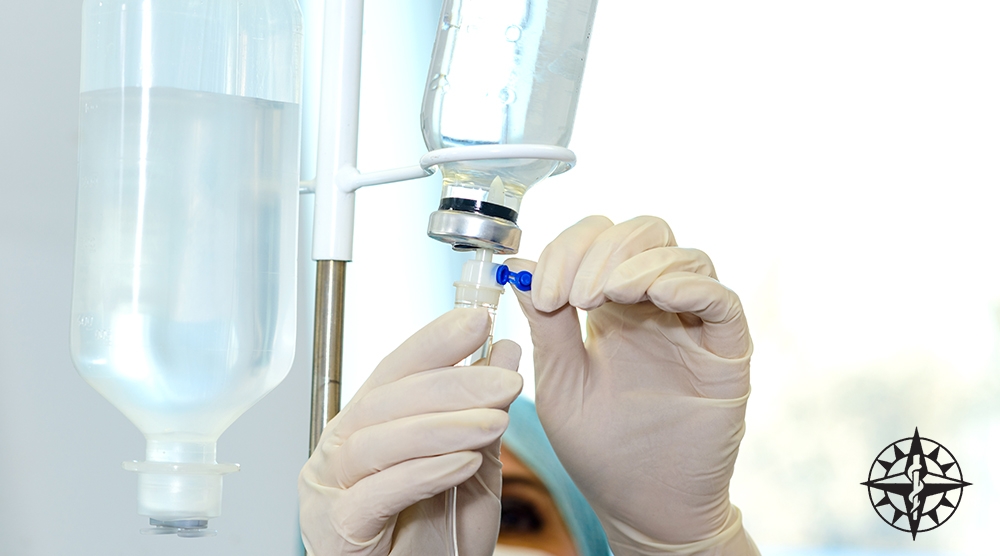Published on: April 14, 2020
Receiving medication by infusion therapy is a method of administering a drug by a needle or catheter inserted into a vein. In the hospital, IV therapy is commonly used when a patient cannot take medications orally or for treatments where an intravenous route is more effective. Some examples are to treat serous infections, cancer, dehydration, gastrointestinal diseases, or autoimmune diseases. Infusion therapy may need to be continued after discharge or even started as an outpatient to treat certain disease and infections.
Typically, “infusion therapy” is the administration of a drug intravenously, but the term also may refer to situations where drugs are provided through injections into the muscles or directly to the spinal cord (epidural). A session of infusion therapy can vary from less than 1hour to up to 3 hours depending on the drug and what is being treated.
The expense of infusion therapy can be an obstacle for some patients. Receiving infusions in the hospital typically can cost up to twice as much as therapy in an outpatient office infusion center. For patients who require multiple treatments over an extended period, their best option may be to have this performed at specialized facilities such as infusion centers. These centers are generally more comfortable and private than the hospital and are frequently less expensive.
Treatment and Side Effects
Infusion therapy usually begins with the insertion of a sterile catheter or needle into a selected entry point. This entry point may be a vein on the back of the hand or in the crook of the arm, or via a surgically implanted catheter in the chest. Your doctor will advise you on the best method for your case.
An infusion bag or bottle is suspended from a stand near the patient to allow for a controlled rate of infusion. Drugs may also be administered via a manual syringe or infusion pump.
Some examples of illnesses that may need to be treated with Infusion Therapy are among others:
- Serious Infections
- Cancer
- Dehydration
- Gastrointestinal diseases / disorders
- Congestive heart failure
- Crohn’s disease
- Hemophilia
- Immune deficiencies
- Multiple Sclerosis
- Rheumatoid arthritis
Possible side effects of treatment can include:
- bruising or bleeding at the injection site
- flushing, or the reddening and warming of the skin
- chills
- nausea
Less common is an infusion reaction. For some people, the drugs administered can react with the skin. This is more likely to occur within the first two hours of administration but can be seen up to 24 hours later as well. These symptoms can include:
- hives
- scaly patches on your skin
- warmness or fever
- rash
Afraid of Needles?
A fear of needles or injections, also known as trypanophobia, is not as uncommon as some may think. It has been found that anywhere from 5% to 20% of patients have this fear, some to the point that they actively avoid doctor or dentist visits due to their fear.
If you or a loved one has a fear of needles and infusion therapy has been determined to be the best option for your treatment, the first thing to do is speak with your healthcare provider and explain any anxiety. It’s likely they have met other patients with the same fears, and they will take steps to make the process more manageable.
Some good strategies may include laying down with the patient’s legs raised above their head, the use of topical anesthetics to reduce pain, or behavioral and pharmacologic approaches such as anxiety-reducing medications or exposure therapy. Overall, keep in mind that a fear of needles is perfectly understandable and speaking honestly is best.
Our Infusion Services
Infectious Disease Associates of Tampa Bay has a team of physicians, a highly skilled nursing staff, and two state-of-the-art ambulatory care facilities to offer our community the highest quality outpatient infusion services available. Our goal is to provide efficient, friendly, and comprehensive care under direct physician supervision at our two convenient locations.
Infusion Therapy may be needed as part of the discharge plan for many hospitalized patients from different surgical and medical services. Additionally, outpatient infusion services may prevent a hospital admission or readmission. For more information, call us at (813) 251-8444.





